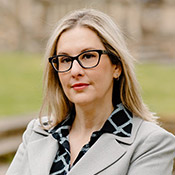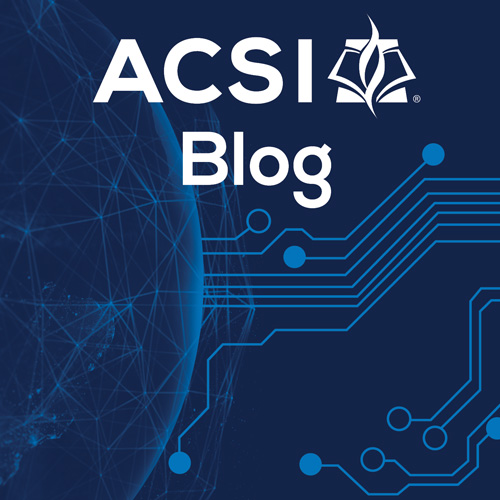ACSI Research Fellow Program
The Research Fellowship program at ACSI offers a unique opportunity for talented researchers to contribute to advancing the field of Christian education while addressing critical global challenges. By fostering collaboration, knowledge exchange, and innovative research, the program aims to make a significant impact on the world stage.
Program Aims:
- Create a vibrant and inclusive international research community.
- Foster collaboration, knowledge exchange, and innovative solutions to address both US and global challenges through research projects in Christian education.
Program Oversight:
- The fellows will collaboratively work with ACSI’s research department and Thought Leadership and the Research Director will oversee the program.
ACSI Fellows Collaborate on Research to Advance Faith-Based Education
ACSI Fellows collaborate with the Thought Leadership team (Research Department) to develop research and Working Papers on important topics in education, spirituality, and culture, focusing on their impact within the realm of Christian education. Their work addresses current trends and challenges, offering valuable insights for advancing faith-based learning.

RiB is a biannual publication by ACSI, aimed at sharing the latest research findings and insights on the Christian school sector. It is available exclusively to ACSI member school and is managed by ACSI Director of Research.

Lynn Swaner Ed.D.
President of Cardus USA – ACSI Senior Research Fellow

Matthew Lee, Ph.D.
Clinical Assistant Professor of Economics at Kennesaw State University - ACSI Senior Research Fellow

Francis Ben, Ph.D.
Associate Professor & Head of Postgraduate Coursework and Research at Tabor College Adelaide Australia – ACSI Global Research Fellow

Alison Heape Johnson
PhD candidate at the University of Arkansas – ACSI Junior Research Fellow
Eligibility:
- Understanding of Christian education.
- Strong academic credentials (e.g., relevant degrees, publications, minimum a Ph.D. candidate in education programs for Junior Fellow and a Ph.D. or Ed.D. for Senior Fellow).
- Demonstrated research excellence.
- Experience in international research collaboration.
- Excellent English communication skills.
- Minimum five years experience of doing research.
Nomination and selection process:
- The selection of the fellows is done through ACSI’s internal nomination.
Commercial Insurance and Risk Management Practices Among ACSI Member Schools: Key Findings from the 2024-25 ACSI CIRM-BR
Introduction to the 2024-25 CIRM-BR
Risk management is a crucial aspect of school administration, yet research on the specific needs of Christian schools has been limited. To address this gap, ACSI’s 2024–2025 Commercial Insurance and Risk Management Benchmarking Report (CIRM-BR) aimed to provide valuable insights into the unique risk profiles and insurance options for Christian schools. The report presents key findings from a national survey of ACSI member schools, covering areas like insurance purchasing, risk management practices, and consumer sentiment.
This research summary highlights trends in insurance purchasing behavior, focusing on renewal dates and carrier selections, as well as statistics on commonly purchased insurance coverage, such as Property and Umbrella/Excess policies. Additionally, it offers a look into the concerns schools have about rising insurance costs and high-cost claims. Although this is not an exhaustive analysis, it provides a high-level overview of the full CIRM-BR report and aims to empower Christian school leaders with deeper insights into their insurance decisions.
Data
Administered through Survey Monkey from February to April 2024, the CIRM survey received about 260 responses from individuals responsible for insurance and risk-financing decisions at ACSI member schools, such as business managers, CFOs, and administrators.
Key Findings from the 2024-25 CIRM-BR
Below are some of the 2024–2025 CIRM-BR’s most impactful findings:
1. Nearly two-thirds (64%) of ACSI member schools currently purchase commercial insurance for their school from one of three insurance carriers that have historically served predominantly religious institutions.
2. More than half (51.8%) of ACSI member institutions’ commercial insurance policies renew annually during Q3 (from July 1 to September 30), with 36% of all policies renewing in the month of July.
3. Almost two-thirds (63.2%) of ACSI member schools are responsible for all commercial insurance purchasing decisions and annual premium payments, while 8.7% of schools pay nothing directly for commercial insurance because they are covered by their host church or other similar partnership’s insurance. The remaining percentage of schools either purchase only certain lines of insurance coverage, utilize alternative forms of risk transfer, or benefit from insurance coverage provided through some host church, parachurch/nonprofit organization, or investment group’s policy.
4. Almost nine out of ten ACSI member schools (86.7%) purchase property insurance (predominantly inclusive of wind coverage). On average, property/wind insurance premiums make up about 45% of total annual insurance premium expenditures for ACSI member schools.
5. Property and wind insurance claims are among the most severe and likely claims filed by ACSI member schools. Just over one-quarter (25.8%) of ACSI member schools that purchase property insurance experienced a property claim within the past 5 years, for which the average claim cost was ~$113K (~$41K at the median). Just over one-eighth (12.9%) of ACSI member schools experienced a wind claim within the past 5 years, for which the average claim cost was ~$331K (~$52K at the median).
6. A large percentage of ACSI member schools fail to maintain liability limit congruity across critical ancillary lines of liability coverage such as sexual abuse, molestation, and misconduct (SAMM), as well as cyber liability. In these cases, the occurrence limit for member schools’ general liability is typically $1M on average, but the ancillary liability coverage limits are often far less.
7. Most ACSI member schools (86.4%) purchase either umbrella or excess coverage, with the median coverage limit being $4M ($4.4M, average). However, most umbrella/excess policies are not true follow-form policies as they do not extend over sexual abuse, misconduct, and molestation (SAMM) or traumatic brain injury (TBI). About half of umbrella/excess policies extend over commercial auto, and roughly 65% of these policies extend over educators’ legal liability and management liability coverages (directors and officers and employment practices liability). One-quarter (25%) of all ACSI member schools’ umbrella/excess policies only extend over general liability coverage.
8. We can generalize the rank order of expressed priorities related to insurance and risk management concerns measured in our survey from ACSI member schools roughly as follows:
• Insurance pricing
• Claims: costs and reputational damage or interruption to services
• Clarity: coverages and limit selection or carrier sentiment
• Risk management process
Despite the increasing complexities and difficulties inherent to Christian school risk management, including decreased coverage accessibility due to hard-market conditions or carrier appetite and the rising costs of insurance coverage, the expressed level of concern and rank order of expressed concerns reinforces the idea that, on average, ACSI member schools view risk management and risk financing primarily as easily accessible consumer products rather than increasingly complex advisory services.
9. Our report provides strong evidence that ACSI member schools’ insurance purchasing decisions vary across several distinct categories, including size of school, ACSI geographic region, and total annual insurance premium expenditure. Likewise, the stated level of concern varies across these categories. We explore these differences in detail in our report.
Final Thoughts
In light of this sampling of the CIRM-BR’s findings, here are a few important questions for Christian school leaders to consider:
Is your school interested in taking proactive steps today toward the assurance of risk management best practices and risk financing efficiencies?
Does your Christian school wish to work collaboratively with other ACSI member schools to shine a light on this and other costly expenditure line items?
Could your school benefit from conducting comparative analyses of current risk management practices and commercial insurance purchasing against ACSI’s nationally representative benchmarks for coverage, pricing, and limits?
The 2024-25 CIRM-BR is only the beginning of ACSI Research’s exploration into matters of Christian school business, finance, and administration. We look forward to continuing to serve our valued member base through these and other financially impactful reports.




Leave a comment